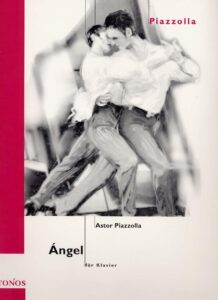Come join us now, and enjoy playing your beloved music and browse through great scores of every level and styles!
Can’t find the songbook you’re looking for? Please, email us at: sheetmusiclibrarypdf@gmail.com We’d like to help you!
Oblivion (Astor Piazzolla) for Cello and piano arrangement
Best Sheet Music download from our Library.

Please, subscribe to our Library.
If you are already a subscriber, please, check our NEW SCORES’ page every month for new sheet music. THANK YOU!
Oblivion is an instrumental composition by Astor Piazzolla from 1982,1 which is part of the soundtrack of Enrico IV, a film by Marco Bellocchio. The piece was originally instrumented for bandoneon, piano and bass. It has become one of Piazzolla’s most popular works, being covered in numerous instrumental features and recorded on many record productions.
The piece was composed by Astor Piazzolla in 1982, during his stay in New York City. Piazzolla composed it, trying to evoke the musical image of oblivion.
The piece was included in the film Enrico IV, by Marco Bellocchio, in 1984. The work is an adaptation of the self-referential play by Luigi Pirandello, in which the character who represents Enrique IV in a play, suffers a falls and loses consciousness, and when he wakes up he has already assumed the identity of the represented character; that is, King Henry IV. Since then, the piece became one of Piazzolla’s most popular, being considered captivating and atmospheric.
In May 2021, the San Juan Bicentennial Theater held an exhibition titled ‘Oblivion, the sounds of silence’, in reference to Piazzolla’s piece. This exhibition, held in the context of International Museum Day, offered a collection of instruments, as well as a tribute to Astor Piazzolla himself.
Oblivion was written in 1982 and used in the soundtrack of Mario Bellocchio’s film, Enricho IV. There are many versions of this piece for different combinations of instruments. This performance features Latvian violinist, Gidon Kremer and comes from his CD, Hommage a Piazzolla.
Like all great music, Oblivion conjures up a complex mix of emotions which cannot be put into words. What feelings does this piece evoke for you? As you listen, pay attention not only to the melody, but to the underlying harmony and rhythm in the bass and piano.
Cellist, Yo Yo Ma has some interesting thoughts on Piazzolla’s music and the tango tradition in Argentina:
Tango is not just about dancing. It is a music of deep undercurrents. Because of what Argentina went through as a country, tango has become the soul of Argentina. Music is always one way people can speak when they aren’t allowed to express themselves otherwise. And Piazzolla’s tangos have the great strength of true voice…. Piazzolla’s music is endlessly passionate—full of yearning—and at the same time tremendously contemporary. There’s a quote to the effect that Piazzolla is the Ellington of Argentina, and in a way it’s true. He actually took the tango to another level by inhabiting his music. The music grew in him, and he adeptly incorporated the influences of his surroundings—whether from New York, Paris, or Buenos Aires. During the almost forty years he worked on his music, Astor Piazzolla tried many different variations—even tried an electronic ensemble! Because of this experimentation, and also his ingenuity, focus, and hard work, his music has many levels of expression and a tremendous depth. His is a truly successful synthesis of the tango and the contemporary.
Analysis

The piece is a lyrical milonga, a Uruguayan-Argentine musical rhythm that is a precursor of tango. The piece evokes nostalgia and sadness; taking into account that the English word ‘oblivion’ can be translated as ‘oblivion’ in Spanish.
Originally the piece was written for the instrumental ensemble of bandoneon, piano and bass. The score marks Adagio and the time signature is in 4/4. The key of the work is C minor and has an A-B-A’ structure.
The main theme is played by the bandoneon from the beginning, with an arpeggiated accompaniment that is subtle. The melody is melancholic and is built with prolonged notes. There is a middle section with a certain contrast.

Versions
Oblivion is a popular piece by Piazzolla, which is why it has been covered and recorded on several occasions. There are various versions for solo piano, clarinet, saxophone quartet, oboe and orchestra, etc.3
There is a version of the piece with lyrics, which was written by Horacio Ferrer. Later, New York composer David McNeil also added alternative lyrics.
Browse in the Library:
Or browse in the categories menus & download the Library Catalog PDF:
